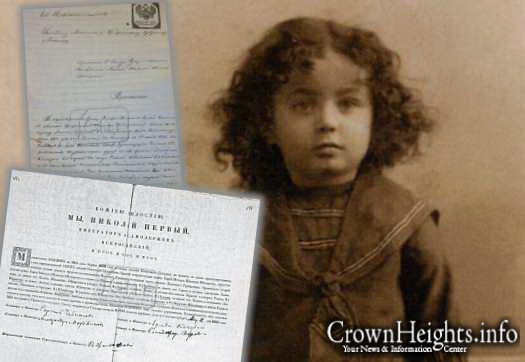
Why Was the Rebbe an Honorary Citizen of Russia?
Research for a new book on the life of the Rebbe—Rabbi Menachem M. Schneerson, of righteous memory—has uncovered mid-19th century records in the Russian State Historical Archive in St. Petersburg that shed important light on a chapter of Chabad-Lubavitch history long clouded by the mists of time.
The documents reveal the origins of the Rebbe’s status as “Honorary Hereditary Citizen” of the Tsarist Empire and offer new insight into how Chabad’s 19th-century leaders dealt with the challenges of their times.
The new information was discovered as part of a multi-year research project into the seventh Rebbe’s early life. Spearheaded by Chabad’s audio-visual preservation and production agency, Jewish Educational Media (JEM), the fruits of this meticulous fact-finding effort are chronicled in a new book titled “The Rebbe’s Early Years,” which will be published in July.
“The goal of the project,” explains Rabbi Levi Greisman, the project’s manager, is to “offer a 360-degree picture of the Rebbe’s early life by presenting every extant document,” including government records, letters, diaries and school papers.
The completed work will include facsimiles of primary sources, an explanatory commentary in English, and copious citations and cross-references.
Refusing to rely on tradition or second-hand testimony, the team decided not to take any fact for granted. Upon encountering the appellation “Hereditary Honored Citizen” in the Rebbe’s birth certificate, Greisman set out to find the documentation behind the title. As it turned out, his insistence proved not so trivial after all.
Trove of Czarist Documents
The records newly unearthed in St. Petersburg date from the days of the Rebbe’s 19th-century namesake and ancestor, Rabbi Menachem Mendel of Lubavitch (1789-1866), the third Rebbe of Chabad, commonly referred to as the “Tzemach Tzedek.”
The history of the title, which in Imperial Russia was the highest rank short of titular nobility, finds its origins in the recently discovered imperial documents from the court of Czar Nicholas I.
These documents invoke a little-known law entitling anyone who settled more than 100 Jews on their own land to seek Hereditary Honored
Citizenship. As his father-in-law, the second Chabad Rebbe, had done before him, and his grandfather, Chabad’s founder, had done before him, Rabbi Menachem Mendel assisted Jews to own and settle land as a way to advance their tenuous economic and political situation.
Dated between the years 1849 and 1852, the documents note that in 1846, Rabbi Menachem Mendel purchased an estate—named Schedrin—of 17.5 square kilometers, lying slightly southeast of Babruysk, Belarus. He settled 60 Jewish families on the land, provided them with building materials and other necessary equipment, and ceded them each a rent free agricultural allotment for a period of 25 years.
In recognition of these services to the community, records show, the Governing Senate of the Russian Empire designated Rabbi Menachem Mendel a Hereditary Honored Citizen.
This status—which Rabbi Menachem Mendel obtained for himself and all members of his family and descendants in perpetuity—would protect generations of Chabad leaders from the draft and from other forms of prosecution, as well as enable them to act as more effective ambassadors for Jews and for Judaism in the offices of the Imperial bureaucracy.
Tireless Research Bears Rich Fruit
This insight into the Rebbe’s family background is one part of the decade-long effort by a dedicated research and editorial team to document the Rebbe’s early life.
In 1998, Rabbi Baruch Oberlander, a noted scholar of Jewish law and history who is the head Chabad rabbi in Hungary, began compiling a list of primary sources related to the Rebbe’s early years. A few years later, JEM began collecting information and interviewing people for its My Encounter with the Rebbe oral history project.
Shmotkin and Oberlander decided to join forces, and also gained the active cooperation of Rabbi Shalom DovBer Levine, chief librarian of the Central Chabad-Lubavitch Library in New York. For more than a decade, the team has utilized the technical skills of professional researchers and academics to scour archives across Europe, making a number of remarkable discoveries.
Professor Carol Shyman, a researcher affiliated with the University of Paris (UPMC, formally the Sorbonne), has been involved in JEM’s project since 2006. It was Shyman who combed through page after page of university records to find the Rebbe’s enrollment in courses at the Sorbonne in 1937 and 1938.
“Compared to other research projects,” Shyman says, the JEM team displays an unmatched “sense of preciousness” towards every piece of data. “They encouraged me to delve further and further until I had found every last detail.”
In late 2011, when Greisman decided to find out why the title came to appear of the Rebbe’s birth record, he commissioned Ifrah Abramov, a St. Petersburg historian and genealogist who has worked for JEM on a number of assignments, to seek additional information in the Russian State Historical Archive.
“After several months of work,’’ says Greisman, “Ifrah reported that he had found a file that might solve the puzzle of the Rebbe’s honorary hereditary citizenship. Finally, we received high-quality reproductions of an entire cache of documents and czarist records.”
Many more discoveries will soon be published in “The Rebbe’s Early Years,” a comprehensive work on the Rebbe’s life, writings, travels, activities and studies that covers the years from the Rebbe’s birth in 1902 until his departure from France in 1941.
“The details of the Rebbe’s early life and his years in Europe are waiting to be told,” says Rabbi Elkanah Shmotkin, executive director of JEM and the book’s co-author. “We want to empower readers and scholars by putting every piece of this fascinating story directly into their hands.”
Photos:
1 – The document that triggered the search:
This page from the Jewish community’s Registration Book of Jewish Births of 1902-1903 in Nikolayev, Ukraine is the record of the Rebbe Rabbi Menachem Mendel Schneerson’s birth.
The middle entry reads: “Jewish date of birth: 11 Nissan. Circumcised, 18. Place of Birth: Nikolayev. Parents’ Names and Rank: Father – Hereditary Honored Citizen Levi son of Zalman, Schneerson. Mother – Chana. Name and gender of child: Boy, Menachem Mendel.”
2 – Hereditary Honored Citizen:
Copy of the certificate bestowing Hereditary Honored Citizen upon the Tzemach Tzedek and his descendants, signed by five officials and members of the Russian Senate:
“In our order of April 10, 1832, we established the title of Honored Citizen, with the accompanying rights.
“Since the faithful Honored Citizen, the Jew Mendel son of Shachna Schneerson, merchant of the second guild, has proven through documents his right to the title Hereditary Honored Citizen, the citizen, the Jew Mendel son of Shachna Schneersohn and his wife Mushka, and their children… shall be raised to the status of Hereditary Honored Citizen. Now by our order, all his descendants may make use of all privileges granted by this title, just as he himself can.”
3, 4 – Letter from the Tzemach Tzedek to the Governor of the Mogilev region (beginning and end):
“Based on the fact that I have complied with all the above requirements of the law, I request… that you refer [to the Senate] on my behalf that I earned the title Hereditary Honored Citizen, for myself, and for my entire family.”
The letter is signed in Russian by the Tzemach Tzedek.
5 – The Tzemach Tzedek:
Following in the ways of his grandfather, Rabbi Schneur Zalman of Liadi (1745-1812), who was known as “the Alter Rebbe,” Rabbi Menachem Mendel Schneerson (1789-1866) urged impoverished Jews to take up land-ownership and agricultural work as a way to assure a stable source of livelihood, rather than being reliant on good graces of the princes and counts of their regions. In this vein, in 1846, he acquired land in the town of Schedrin, and funded its Jewish development.
Rabbi Menachem Mendel, known as the Tzemach Tzedek, was the third-great-grandfather and namesake of the Rebbe.
6, 7 – Letter of recommendation from the residents of Schedrin:
“We the Jewish agriculturists here in the town of Schedrin… [attest that] from the day in 1846 when we settled on the land of our landowner, the Honored Citizen Mendel son of Shachna Schneerson, until today, he did not receive any payment from us for his land, but rather he helped us every year with acquiring animals, working the land, and with our other business needs…
Therefore we compose this letter of recommendation… that he should receive [the title] he deserves by law… which will enable him to continue to assist us.”
At bottom are signatures of several dozen of the town’s residents in Russian and Hebrew.
8 – The Rebbe as child:
Honored Citizen: Based on the Czarist law, the Rebbe himself was a “Hereditary Honored Citizen” until November, 1917, at the age of fifteen, when the law was abolished by decree of the Soviet’s All-Russian Central Executive Committee.
Reprinted from www.chabad.org.


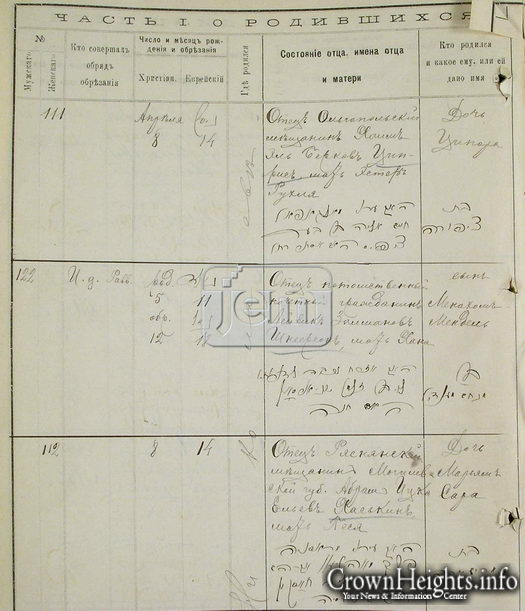
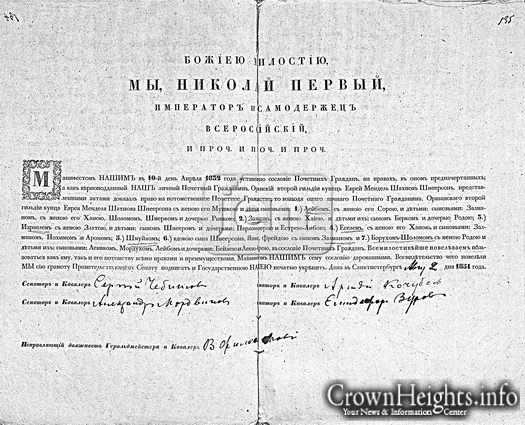
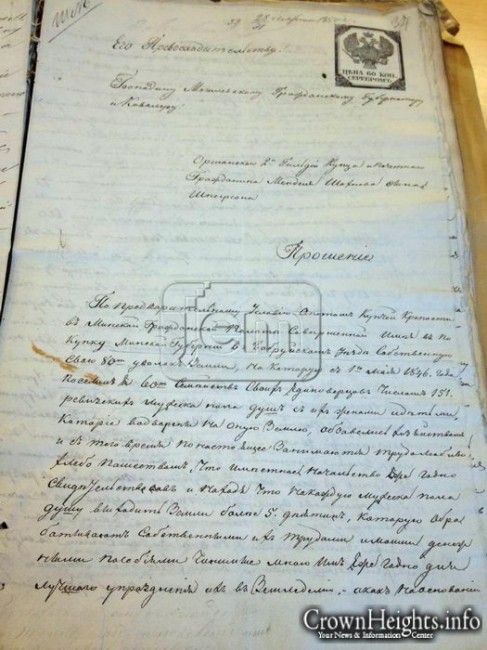
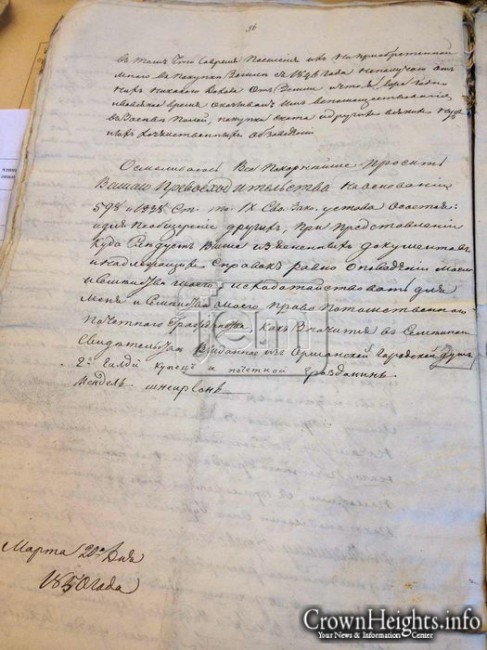
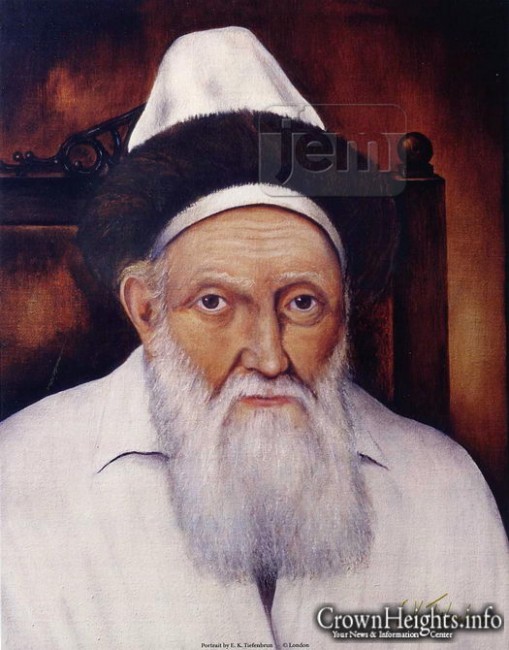
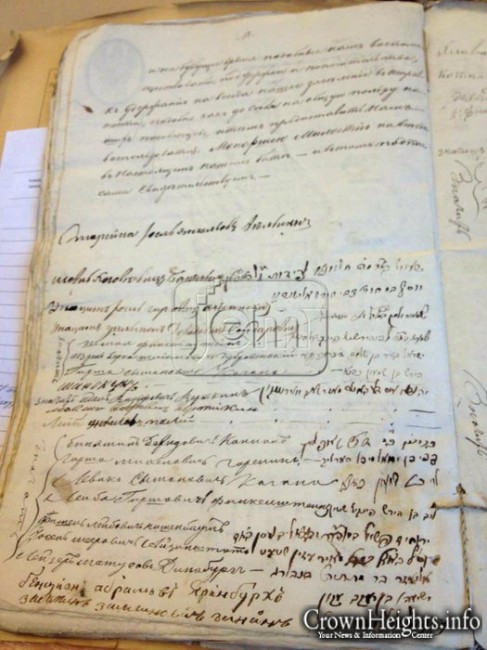
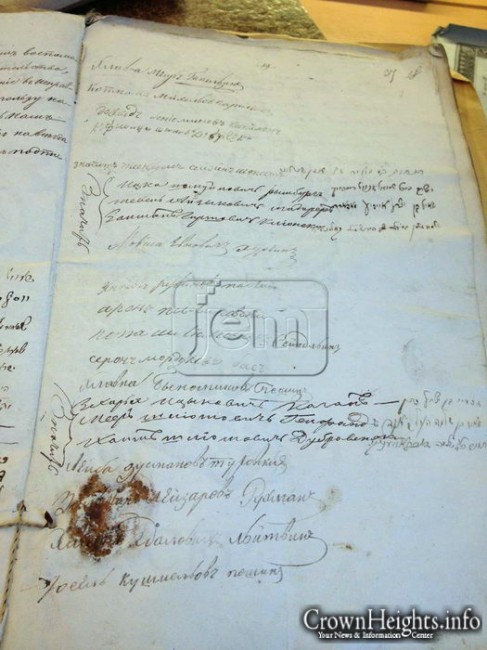
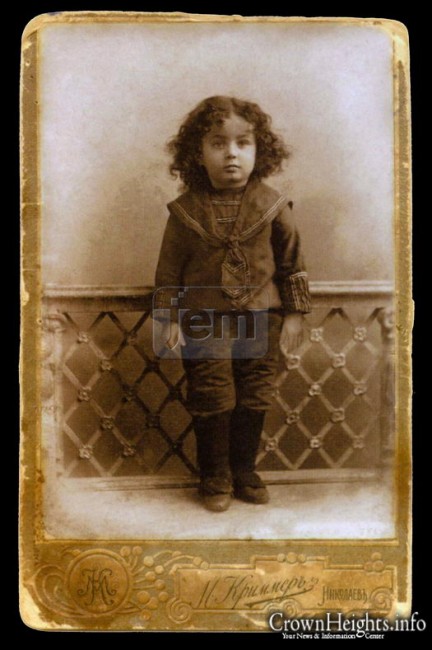














Gershon Beck
Beautiful !
Baruch Hashem, very special what you have posted here.
As we anticipate the Geulah, we are getting to know more and more of our beloved Rabbeim.
Yasher Koach to all those who have put effort into this.
Keep up the wonderful work.
Those folks at JEM are bringing out real Gems :)
Ari
Beyond amazing!
Thanks JEM.